Testimony of former teacher Riza Çiftja, one of the scions of the wealthy and aristocratic Elbasan family, who served in the villages of Laç of Kurbin.
Memorie.al / Among the dozens and dozens of families in the ancient city of Elbasan, the renowned Çiftja family undoubtedly remains a lineage that produced intellectuals and patriots who contributed undeniable values to their family and social circles, the city, and even the country. Discussing the origin, history, and episodes of this family, the descendants of the Çiftja family share fragments from the history of the xhybe (traditional robe) embroidered with gold for Khrushchev and their violin, a gift to the journalist Ehrenburg. From Tasim Çiftja, who saved Mitrush Kuteli in the Maliq swamp, to Riza and Hektor Çiftja, who recount the family’s history before and after the ‘45s?
The descendants of the Çiftja family of Elbasan, with their history little written but much heard, belong to those families who inherited wealth, contributed as patriots, but suffered imprisonment and persecution under the communist regime of Enver Hoxha and his successor, Ramiz Alia. The centuries for this family were full of events, but the bitterest part remains that after the end of the War in December 1944, where some of them were imprisoned, others were targeted, and few could escape the storm that engulfed the wealthy of Elbasan in the class struggle.
Members of the Çiftja family contributed to the Independence of Elbasan, were supporters of the ‘Normalja’ School (Teacher’s College), and benefactors of the city and religion. Across generations, there have been many teachers and writers, all graduates of the Elbasan ‘Normalja’. This family, which still owns one of the old houses by the Castle, preserves special stories linked to Khrushchev, Kuteli, and Ehrenburg. Riza Çiftja, one of the heirs of this family, and Hektor Çiftja, a lecturer at the University of Elbasan, provide details of this family’s history before ’45 and its persecution and marginalization after the rise of the communist regime.
The Çiftja Family before the 20th Century
The Çiftja family has a history spanning several centuries. Several branches exist, originating from the same trunk. A 500-year-old tomb of the Çiftja family trunk was located in the city’s old cemetery (where “Rinia” Park is today). Rizai, the son of Ali, one of the descendants of these family, shares a bit of the history inherited orally within the family.
“My great-great-grandfather was a major silk merchant. During the Ottoman era, Shkodra merchants connected with him for silk goods. My great-great-grandfather collected them, and they came to pick them up wholesale. At one point, he worked for them, but later pursued the trade line himself. He transported goods with pack animals, sent them to Shkodra and from there to Ragusa (Dubrovnik). He took goods in Ragusa, went to Venice, to Genoa, then to Alexandria in Egypt, returned to Istanbul, from there to Monastir (Bitola), and then returned to Elbasan. This journey lasted up to three years and was risky. In many areas, he had to pay customs duties, as they wouldn’t let him pass. He made a profit of 20-30 thousand Turkish liras on that journey. When he returned, he held a big celebration with friends because he had returned safe and sound.”
Later, the traces for several generations are unknown, until Hasan Çiftja, who served as mayor, prefect, and supporter of patriotic movements during the Independence period. Hasan had 5 sons and three daughters: Ali, Xhaferr, Qamil, Kadri (who died in Austria while a student), and Qazim (who died in Monastir, also while a student). The Çiftja family was located opposite the wall of the Castle (today “Skampa”), where the family of Dervish Bej Biçakçiu resided. Rizai states that his ancestors built the Zaranika Bridge.
“My great-great-grandfather contributed to the construction of the old ‘Zaranika’ bridge. Initially, in the first attempt, the rushing waters of the stream washed away its construction, and many began to mock him for the failed idea, but he did not stop. As soon as he gathered the money again, he sent out the town crier (kasneci) and said that anyone who brought a stone from Zaranika for the bridge would be paid 5 mexhide (silver coins), or one Turkish lira (at that time, that amount of money sustained a family for a week). Everyone went to retrieve the stones, even those who mocked him. Before giving them the money, he told them that they had now become his servants, as they had previously ridiculed him, saying the bridge would not stand.
The wealth he created was shared among seven Elbasan families who became friends with the Çiftjas, among them very well-known surnames in Elbasan. When the Austro-Hungarian soldiers came, the bridge built by my great-great-grandfather was damaged. Hasan Çiftja, my grandfather, as the great-grandson of the first builder, repaired it at his own expense and also contributed to the construction of the Gurabardha mosque. The bridge stood until recently. The sons followed the father’s path. Moreover, when Haxhi Qamili entered the city, all the wealthy people who had not contributed to the Muslim faith faced imprisonment and ill-treatment. Aqif Pasha’s house was burned, and many others were ill-treated in the middle of the city. After Haxhi Qamili’s associates arrested my grandfather, they asked him what he had done for the faith. He told them about the Mosque and the Bridge, which bore the name Çiftja. This deed saved him from execution.
As Patriots
Hasan Çiftja was among the wealthy Elbasan residents who contributed to education. “Hasan, my grandfather, was an only son. He is a signatory of the Independence Declaration in Elbasan, on November 25, 1912. When the Elbasan Educational Congress took place, Hasan, together with his son, Ali, were appointed to the commissions for the establishment and running of ‘Normalja’. In the first year of ‘Normalja’, when it finished, a ceremony was held for the people, and many gifts were given. Hasan handed over a clock for the students of ‘Normalja’. Meanwhile, Ali was one of the organizers of the rally held in Elbasan for the Latin alphabet of the Albanian language.
He contributed to the national cause. The Çiftja brothers were also among the main organizers during the protest to prevent the transfer of ‘Normalja’ from Elbasan. The Çiftja family was ranked among the notables of Elbasan at that time. So true is this that when the Hungarian army was leaving, they took the Elbasan notables as a shield to prevent being attacked by the locals. Xhaferr Çiftja, Hasan’s eldest son, was taken from our family. There is also an old photo from this event, which proves that the city’s notables were lined up alongside an Austro-Hungarian general during the departure.”
The Story of Ehrenburg’s Violin
“Hasan sent his son, Kadri, to school in Austria. There he was placed in a room with Ethem Haxhiademi, as our families were connected through marriage. Kadri died in Austria from the cold, and the body arrived embalmed due to the time it took to arrive. My father, in honor of Kadri, went to Aleksandër Xhuvani and paid for a period of time for the dormitory and food of ‘Normalja’ students who came from the districts. The speech at Kadri’s funeral was given by Adem Jahja, as his close friend, and the violin that Kadri had bought in Austria was gifted to him.
At that time, the most famous Russian journalist of that period, Ilya Ehrenburg, came to visit. It was the years ’45-’47 and in his honor, the orchestra of the House of Culture, led by Mit’hat Sejdini, which included several violins, played a piece for him. Adem Jahja’s daughter told me that Ehrenburg specifically requested the violin that came from Austria to buy it. Mit’hat Sejdini gifted it to Ehrenburg, after taking it from Adem Jahja, asking him to buy another one. Among many stories of this family is also the famous Xhybe (robe) that was gifted to Khrushchev during his visit to Elbasan.” Rizai also states that this xhybe was given as a dowry to one of the girls adopted into his family.
“My grandfather had also bought an xhybe from the Bushatlli family of Shkodra, embroidered with gold thread. My grandmother kept the xhybe and gave it as a dowry to one of the girls raised by our family, and it was later taken by the Executive Committee of the district here, to be gifted to Khrushchev, as a precious Albanian symbol, during his visit to Albania in 1959. Many girls were raised in the Çiftja family, who were poor and had no one. The family raised them as their own daughters, prepared their dowries, and married them off. This phenomenon also occurred in the family of Aqif Pasha.”
Hasan Çiftja, How He Became Mayor
Hasan was neither with Vërlaci nor with Aqif Pasha. During a period when Elbasan was left without a mayor, he was temporarily appointed, as he was acceptable to both sides. It was the time when the Durrës government had been formed and the Lushnja government was also established. During this period, he received a letter from Durrës, which read: “Elbasan, which government are you with?” and Hasan Çiftja gathered the council to decide this, while he himself left, so as not to be involved in the decision. When the answer became mandatory, Hasan declared that he chose the older government, giving a clever answer.
We must keep in mind that at that time, one government was preferred by Aqif Pasha, while the other by Vërlaci. He also served as the prefect of Elbasan. Hasan is also remembered as one of the mayors to be emulated, as during a bread crisis, when the price had been artificially increased by merchants, he managed to lower the price. He gathered all the producers, asked them to lower the price, and when they refused, he opened two bakeries with his own money and produced bread at a real price. Faced with this, the producers lowered the price. The connections between the families of Elbasan were reciprocal.
Rizai recounts that the well-known surnames of Elbasan were connected to the Çiftja clan. Hasan’s first daughter was married to Qazim Matraxhiu, prefect of Fan Noli’s administration and brother of the journalist, Emin Matraxhiu. The second daughter was given to Kamber Sejdini, the officer who represented the Albanian government to the Dutch officers who came to help Albania. While the third daughter was married to Hafyz Musa Basha, the son of Haxhi Ali, who was the leader of the Albanian Muslim Committee and contributed to the National Liberation Movement. And the sons also married brides from well-known families.
Regarding this, Rizai says: “My father, Ali, married the daughter of Ali Kopili, one of the biggest merchants in Elbasan, and his second wife came from the well-known Hastopalli family. Meanwhile, one of the sons, Xhaferr, married the daughter of Emin Haxhiademi.” This family also exchanged with the Bungo family. Aqif Pasha was the godfather of Qamil Çiftja, and the family relations were quite close. Rizai says that Aqif Pasha’s son also grew up in his family’s cradle.
“My father told me that Ibrahim Biçakçiu, who would become prime minister in 1944, was rocked in our cradle. Aqif Pasha had two daughters, but no son was born. The women, based on superstitions, since there were 5 sons in our house, took our cradle. Perhaps it was a coincidence, but then Ibrahim was born, Aqif Pasha’s only son. Kamo Sejdini, my aunt’s husband, was killed along with the Dutch colonel, Thompson, in defense of the city of Durrës from the attacks of rebel forces. When the International Commission appointed Dutch soldiers to lead the Albanian army, Zog appointed Kamo Sejdini, one of the externally educated military officers, to represent the Albanian army.”
Persecution of the Çiftja Clan by the Communist Regime!
But after liberation, persecution began for the Çiftja family. Hasan’s sons suffered different fates. Thus, Qamil Çiftja and another Elbasan citizen were made pig herders, with the sole purpose of discrediting them. Qamil had a religious allergy to pigs. One day in the square between the old municipality (today the new building) and the Executive Committee (today the Prefecture), their supervisor deliberately left and met a cadre at the door of the Executive Committee, leaving the two guards with the pigs. The pigs could not be contained; as one ran off in one direction, others ran off on the other side of the cobblestone square.
With sticks in their hands, they chased after the pigs that were leaving the herd. While the other guard fainted from the situation, Qamil, though alone, did not lose his composure. He left the pigs and went straight to the supervisor and said: “The pigs are uncontrollable. Do we have a meeting and should I gather them and bring them inside…?” The supervisor understood the irony and replied: “Go quickly, toward the Old Sports Field road…!” Tasim Çiftja, Hasan’s nephew, Xhaferr’s son, was arrested, labeled part of an enemy group against Albania, among whom was also Salim Ceka, who translated Schopenhauer. The trial was fake and with absurd accusations.
Following the prison sentence, Tasim was sent to Maliq, where he stayed with Makensen Bungo, Virtyt Gjylbegu, and Hamza Tusha, from Fushë-Mbret, assigned to extremely difficult work to drain the Maliq swamp. While working with heads bowed in the swamp, the young men heard the screams of the guards towards Dhimitër Pasko. Few knew who he was, as he was known by the name Mitrush Kuteli, but they heard how he was constantly tortured for the quota he had to meet. Because of his stronger physique and greater work, Hamzai was commanded to go and get Dhimitër Pasko to transfer him to their brigade.
Hamzai managed to bring him, and the young men told him not to worry about the quota anymore, as they would achieve it for him. This is how Mitrush Kuteli was saved, because the dangers in the swamp were very great; one could end up in the mud and die. And who would believe that precisely Tasim Çiftja, who in 1943, in an article in the newspaper “Bashkimi i Kombit” (The Union of the Nation), would publish the feature: “How Mr. Mitë wove stories,” would save the great writer shortly afterward in the terrible Maliq swamp. Tasim wrote and left behind books, which Hektor Çiftja preserves with the desire to publish them. As a well-prepared intellectual, he did not escape the storm against wealthy and intellectual families. Virgjil Çiftja, Xhaferr’s youngest son, was arrested as an enemy when he was only 13 years old.
In the years 1947-’50, he attended the seven-year school “Bardhyl Popa”. When he was in the 7th grade, an event occurred that would mark his life: he became the youngest dissident in Elbasan. According to some data, the phrase: “Rise up, people, for Russia has oppressed us,” was written on the school walls, and after comparing the handwriting, this phrase was found to be Virgjil’s. He, only 13 years old, gripped by two people, was put into a “Jeep,” and no one knew where they took him. From that day on, Virgjil, for six months straight, after being tortured in the underground cells of Hotel “Grand” (today the old tourism), was sent to the Re-education School (Colony) in Tirana (otherwise known as the “School of Vagabonds”), where he stayed for three full years.
After his release, he was sent as a soldier to the labor brigade at “Rrapi i Treshit” in Tirana, the only military formation deliberately established for young people with bad biographies. In the unit, for the three years of military service, instead of a rifle, he had a pickaxe and a shovel. Upon finishing the military, Virgjil worked as a manual laborer in the Reclamation enterprise. He died young from azotemia, due to the difficult work he did and the tortures he suffered for many years.
Riza Çiftja, How Did He Escape Imprisonment?!
“In that period, it was the time of great friendship with Yugoslavia. In a book, there was a phrase about Kosovo, which the teacher had told us to erase, but we didn’t. At the time when several young people were arrested at ‘Normalja’, I was warned that I would be arrested and left for Tirana. I started school there, but I did not apply for a scholarship because I knew I wouldn’t get one. Our director was Shemsi Totozani, while the language teacher was Ziaudin Kodra, who began to like my comments and read them. I finished school and was appointed in Tepelenë, in Koshtan, 9 hours away. Poverty was extreme.
Food was available with ration cards. We bought two goats, and made pastërma (dried meat). We boiled potatoes, cut them, dried them, and kept them to boil again when we would eat them. The Party Committee in Elbasan sent a letter to Tepelenë, requesting my dismissal, and I was dismissed. I returned to education in ’55, in Laç of Kurbin (Krujë district), in a village. They sent me to Fushë-Milot. They transferred me from there and sent me to the village of Gramëz. That is how my years in education passed, until I retired in the city of Laç, where I lived with my family for years.”
The generations of the Çiftja family continue. Rizai has a son, a dentist, and a daughter, an employee in Italy, where she lives with her family, while Tasim Çiftja’s son, Hektor, is a lecturer in journalism at the University of Elbasan. This family, which knew the splendor of wealth before liberation, would know its nationalization, persecution, and a difficult life afterward, until the arrival of democracy. Hektor shows that the form chosen by the sons and daughters of the Çiftja clan to escape intellectual poverty and the difficulties of the day was a competition held among them whenever they gathered together.
Having become manual laborers, they would gather in the evening at home and recite the verses of Dante and many world authors, competing with each other, so as not to fall into a difficult state and to escape the tragic reality that did not spare wealthy families, even though they were known for their patriotic contribution and were all educated at ‘Normalja’ of Elbasan, which is rightly considered as; The First Albanian University. Memorie.al




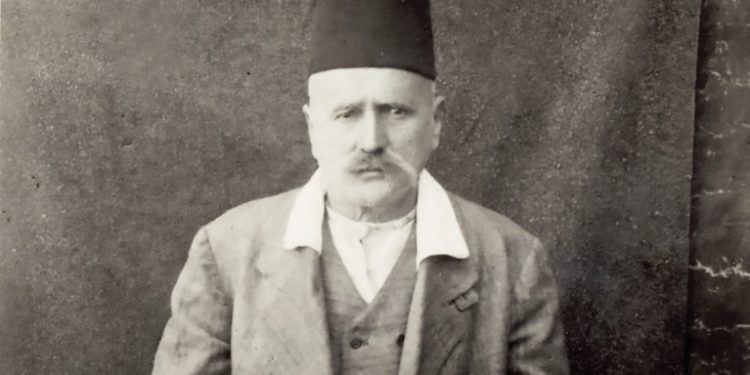
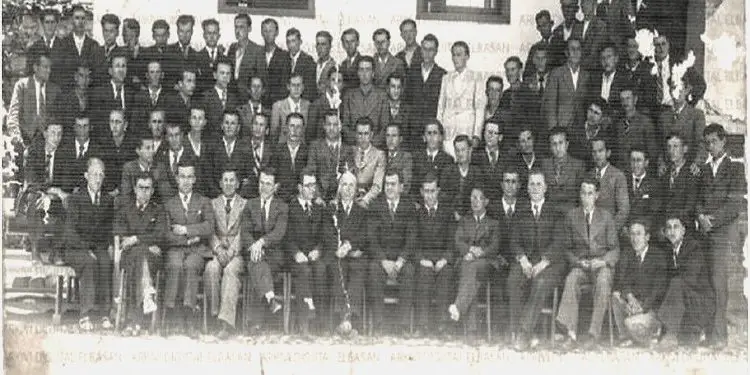
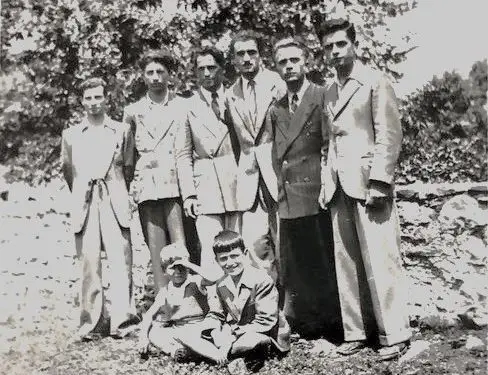
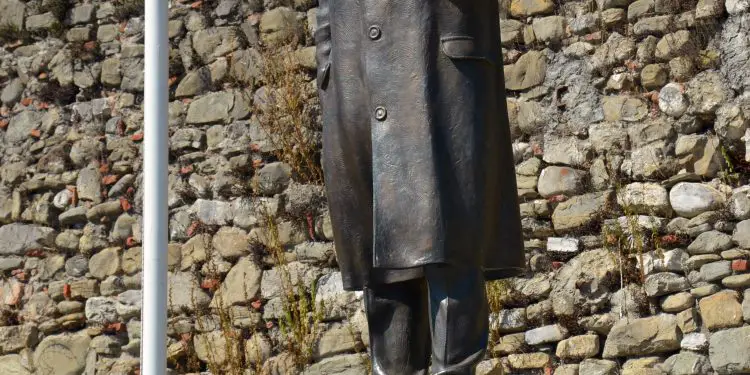



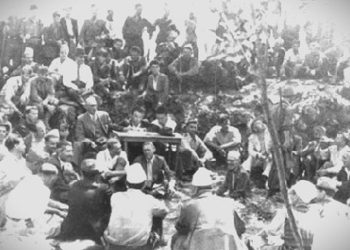
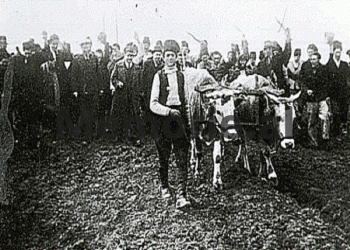
![“They have given her [the permission], but if possible, they should revoke it, as I believe it shouldn’t have been granted. I don’t know what she’s up to now…” / Enver Hoxha’s letter uncovered regarding a martyr’s mother seeking to visit Turkey.](https://memorie.al/wp-content/uploads/2026/01/Dok-1-350x250.jpg)
